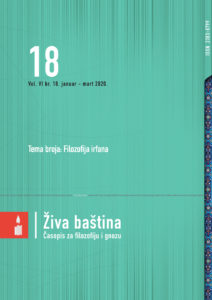Je li Ibn Arebijeva ontologija panteistička?
Is Ibn ‘Arabī’s Ontology Pantheistic?
Author(s): Mohammed RustomContributor(s): Haris Dubravac (Translator)
Subject(s): Islam studies, Middle-East Philosophy, Philosophy of Religion, Ontology
Published by: Fondacija “Baština duhovnosti”
Keywords: Ibn ‘Arabī; ontology; tawhīd (God’s Oneness); wahdat al-wujūd (the Oneness of Being); system; pantheism; panentheism; monism; God’s transcendency; God’s immanence;
Summary/Abstract: Ibn ‘Arabī’s ontology, which has become known as waḥdat al-wujūd (the Oneness of Being), although he himself had never used that term, has been the subject of many debates in contemporary academic research studies. The idea that there is only one wujūd that exists – namely God’s being – was considered by Ibn ‘Arabī to be the highest expression of tawhid (God’s Oneness). His ontology is often wrongly considered to be pantheistic, because of the reductionistic inclinations of the majority of researchers who were writing during the nineteenth and at the beginning/the middle of the twentieth century. At the same time, it should be kept in mind that there is no medieval Arabic synonym for the English word “pantheism”. In this paper, the author at the beginning summarizes Ibn ‘Arabī’s ontology, and then explains the main reasons for which it has been described as pantheistic. At the end, he presents several arguments to show why such a notion, as well as panentheism and monism, represents his metaphysical worldview, which did not manifest itself in the form of a system, in quite a wrong way. While emphasizing God’s immanence, Ibn ‘Arabī surely never stops pointing out His transcendency.
Journal: Živa baština: časopis za filozofiju i gnozu
- Issue Year: VI/2020
- Issue No: 18
- Page Range: 72-79
- Page Count: 8
- Language: Bosnian

